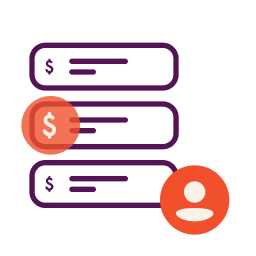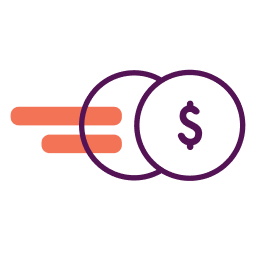Cash Flow Loans
Cash flow keeps a business going. When cash flow is tight or uneven, consider a cash flow loan or cash flow financing.

Cash Flow Loan Details
Loan Amounts
$500 – $500,000
Interest rates
11.9% – 90%
Repayment Terms
3 – 36 months
Turnaround Time
1 – 7 days
Pros
- Fast access to money (hours – days)
- Low credit scores may be OK
- Less documentation needed
- No physical collateral required
- May build business credit
Cons
- Higher interest rates (11.9% – 90%)
- Typically must have 1 year in business
- Shorter repayment terms
- Documented revenue required
Get to Know Cash Flow Loans
Gerri Detweiler • August 8, 2023
Cash Flow Loans Pros and Cons
Pros of cash flow loans
Pros
- Fast access to money (hours – days)
- Low credit scores may be OK
- Less effort and documentation needed
- No physical collateral required
- Can improve credit scores
When it comes to business financing options, few will put cash in your bank account quite as quickly as cash flow loans of financing. And if you don’t have collateral or assets to pledge for a secured loan, you’ll appreciate the fact that aren’t likely needed for this type of small business financing.
While some cash flow lenders may look at your personal credit scores or business credit reports, generally credit is more flexible than with other loan options. With this type of financing, you mainly have to prove strong revenues that assure a lender that you can easily manage repayment.
Cons of cash flow loans
Cons
- Higher interest rates (11.9% – 90%)
- May require daily or weekly payments
- Paying early may not save money
- Typically must have 1 year in business
- Strong documented revenue required
On the other hand, these short-term business loans can be one of the more expensive types of lending options for businesses. It’s not alway easy to compare what you’ll pay in interest and fees, and you can end up paying the equivalent of 11-90% annual percentage rate (APR).
Small business owners may not like the fact that some cash flow loans for small business take payments directly out of their bank, merchant processing, or online seller account to pay back the financing. Those payments can affect future cash flow
Thinking of paying off your loan or financing early? You might not save money as you would if you paid other types of loans off faster. Be sure to check the fine print to see if that’s the case.
And finally, if you haven’t been in business six months or more, you might not qualify.
Access better funding options with a solution you can’t get anywhere else
Reduce the pain in financing with streamlined applications, instant offers and approval rates that are 3.5X higher than industry averages.
What Are the Types of Cash Flow Loans?
There are several types of cash flow loans; after all, any type of financing that is used for cash flow purposes can be considered a cash flow loan. This term describes the way funds will be used, rather than a specific type of financing.
The most common types of small business cash flow loans or financing are:
- Merchant cash advances and business cash advances
- Business lines of credit
- Invoice factoring and invoice financing
With a merchant cash advance (MCA) or business cash advance (BCA), a financing company evaluates the previous sales of the company to determine how much to advance the business; typically 60—100% of the average monthly sales for the past three to six months.
These companies may use business bank account statements to verify revenue, while others look at credit and debit card sales. The business gets an advance against expected future sales by giving the lender the rights to a predetermined amount of these receivables.
With a business line of credit, the business is approved to borrow up to a specific credit limit. When funds are repaid the business can borrow again.
With invoice financing and factoring, the factor (or company offering business funding) will offer immediate payment against outstanding invoices.
Short-Term Cash Flow Loans
Cash flow loans are short-term loans used primarily for working capital (day-to-day expenses like inventory or labor), or to take advantage of opportunities that require additional capital to launch.
The borrower’s personal credit history and/or business credit scores may be checked, but may play less of a role than factors like revenues and how long the business has been doing business.
As the name indicates, when it comes to underwriting, lenders are often most interested in business cash flow when evaluating applications. It is common for some lenders to have minimum annual revenue requirements, and to require business bank statements or other forms of documentation.
Interest rates/costs may be higher than other forms of financing but can vary depending on business qualifications.
Still, even with higher interest rates, business owners may find cash flow loans beneficial, especially if they’re looking for fast funding and don’t qualify for better deals on a traditional bank loan.
Warning:
If you are relying on one of these loans because your business has serious cash flow issues, you may make things worse. Be sure to consult a financial advisor. If you don’t have one, you can get free help from your local Small Business Development Center or SCORE.
How Does a Cash Flow Loan Work?
Business cash flow loans, frequently offered by online lenders, provide small business owners with access to working capital, often by analyzing past revenues to predict future cash flow.
The business owner usually applies online, and provides documentation including business bank account statements (or by linking to that account), as well as information about time in business, ownership, etc.
Where asset-based lending requires business assets as collateral, here, the business owner may be required to pledge future accounts receivables, depending on the type of cash flow loan..
Funding is often quick, with turn around times ranging from same day to a few business days.
What Is Asset-Based Business Lending?
Loans and financing typically fall into one of two categories:
- Secured
- Unsecured
Secured loans, also known as asset-based loans, require collateral (asset) to secure the loan. That could be real estate or equipment, for example. The lender has the right to seize the asset if the loan is not repaid.
Typically secured loans are for people who don’t have great credit or who don’t otherwise qualify for unsecured loans. But they can also be used to obtain better rates and terms on a loan.
Unsecured loans do not require collateral, though some may require a personal guarantee (PG) which allows the lender to attempt to collect from the borrower’s personal assets, not just the business, in event the loan is not repaid.

Find The Right Financing For Your Business
Don’t waste hours of work finding and applying for loans you have no chance of getting — get matched based on your business & credit profile today.
Fast Cash Flow Loans
Here’s the main thing you need to understand about this type of financing: there is a tradeoff between speed, ease of funding and cost.
Business owners who can’t get a traditional bank loan may qualify for this type of financing, or who don’t have time for the longer bank loan application process, may find this type of financing fast and easy.
However, when it comes to financing options for your business, cash flow loans generally aren’t the cheapest type of financing.
You will likely pay a much higher cost for access to these funds, and the cost isn’t always stated as an interest rate or APR. In some cases, it may be better to wait until you build your credit and can qualify for a better rate elsewhere.
There are, however, some instances where they make sense; for example, if your credit is less than perfect, or you need a fast cash flow finance option.

Which Cash Flow Loan Is Right For My Business?
There’s no one-size-fits-all solution when it comes to cash flow loans. The one you choose needs to be right for your business needs. Consider the following:
Repayment terms: Are you looking for a term loan with monthly payments, or are you willing to allow payments to be taken out of your account each day or week? Do you want a lump sum, or would you rather have a credit line that lets you borrow funds only when you need them? Repayment periods can vary significantly depending on the type and source of funding.
Cost: How much will it cost to repay the financing? Are there origination fees or other costs charged upfront, or is interest charged only when you borrow? Is there a prepayment penalty if you want to pay back the financing faster?
Loan amount: How much money do you need? It can help to analyze your cash flow to understand your regular expenses, as well as to budget for anything unusual coming up, such as hiring more staff or expanding office space.
Speed: How quickly do you need financing? Are you willing to pay a premium to get the money faster, or can you afford to wait a few weeks or months, opening you up to lower interest rates?
Qualifications: And finally, what kind of business cash flow loan do you qualify for? New businesses or businesses with declining revenues will have fewer options.
The Best Lenders for Cash Flow Loans in 2023
What Are the Requirements to Qualify for a Business Cash Flow Loan?
When it comes to working capital loans for cash flow, each company has different requirements.
Most require at least one to two years in business though a few will provide financing to younger businesses with strong revenues.
Many will require a business bank account to qualify. If you are using a personal bank account, open a business bank account right away and use it going forward.
If there is a personal credit check it may be a “soft inquiry,” which doesn’t impact your credit scores. Minimum credit score requirements may be flexible, and some companies don’t require minimum credit scores.
Personal and business credit checks may be used to rule out financing to those with certain types of negative information, such as an open bankruptcy, undisclosed debt, or other problems such as tax liens or judgments.
Can You Get A Cash Flow Loan With Bad Credit?
One of the biggest benefits of cash flow loans is that you may qualify if you have creditworthiness issues, including bad credit.
Maybe you have credit card debt, or maybe your business is too new to have much credit history. Whatever the reason, you don’t want your credit situation to limit you from being able to access the capital you need to grow your business.
In this case, a cash flow loan may be a way to get the funds you need.
How To Apply for a Cash Flow Loan
While each cash flow lender may have a slightly different process for applying for a loan, you generally can expect to be asked for the following information:
- Your business tax ID / employer identification number, if available
- Social Security Number to verify the applicant’s identity and/or run a credit check
- Government-issued photo identification
- Details about your business, including address, industry, and revenues
When Is a Cash Flow Loan Useful?
If you’re wondering how you might use cash flow lending options to grow your company, you can do far more than just pay your business expenses with the funds. You can use your loan for:
- Covering a cash flow gap
- Taking advantage of opportunities for increasing revenues
- Purchasing highly-discounted inventory
Covering a cash flow gap
For many companies, cash flow management is a constant challenge. Cash flow rises and falls with seasons, or as clients purchase more or less of the businesses’ products or services. You might be flush during the winter holidays, but come summer, business may be slow. A cash flow loan is often used to help ensure the business has the money it needs to make it through to the busy season.
If you invoice clients and wait 30—60 days or longer for payment, or if you tie up cash in inventory, you may not have the capital you need for your day-to-day expenses. Borrowing money can ensure that you can pay your employees and bills without worrying about a cash crunch.
Opportunities for revenue
What would you do if the opportunity to buy deeply discounted equipment came up? Or a big job that requires an initial outlay of cash before you get paid?
Having access to capital allows you to take advantage of opportunities like this. Otherwise, you might miss out on a lucrative deal.
Highly-discounted inventory
Typically, vendors are willing to discount your per-item cost for inventory if you place larger orders. But larger orders require more money. A cash flow loan allows you to save on bulk orders, which ultimately will increase profit margins for businesses like yours.

Cash Flow Loans for Startups
It will be hard for brand new businesses to get this type of financing because the business doesn’t have revenues to qualify. Instead, a new business may want to consider other types of startup loans and funding such as:
- Business credit cards (including 0% APR offers)
- Crowdfunding
- SBA loans
- Friends and family
Alternative Options to Cash Flow Loans
Cash flow loans aren’t your only option when it comes to finding financing. If you have decent credit, look at small business loans, including SBA loans offered by banks and other lenders. You can often get a great rate and favorable terms if you qualify.
A business credit card with a 0% intro APR may also help provide the short-term financing your business needs.
Nav’s Verdict: Cash Flow Loans
If you’re in need of short-term financing and your credit isn’t great, the cash flow lending route could make sense. It’s tough to fully endorse short-term business financing like merchant cash advances because of their high interest rates — but every type of financing plays an essential role for some businesses.
Before jumping into this option, you should have a clear idea of how you plan on using the funds, and confidence that your future sales will cover the loan payments. Payments are typically directly withdrawn from your bank account, which means you must monitor balances to make sure you don’t overdraft.
As a financing tool, cash flow loans used correctly can provide much-needed working capital to create positive cash flow and invest in the future of your business.
Related Resources
- SBA Loans
- Bank loans
- Merchant Cash Advance
- Microloans
- Cash Flow Loans
- Online Business Loans
- Construction Business Loans
- Retail Business Loans
- Restaurant Loans & Financing Options
- SBA 7(a) Loans
- SBA Express Loans
- Business Credit Cards
- Equity Crowdfunding
- Reward-Based Crowdfunding
- Equipment Financing
- Invoice Financing
- How Trade Credit Can Help Your Business
- Medical Practice Loans
- Manufacturing Business Loans
- Commercial Real Estate Loans
- SBA Microloans
- SBA 504 Loans
- SBA Disaster Loans
